- Home
- Jim Kjelgaard
The Lost Wagon Page 4
The Lost Wagon Read online
Page 4
CHAPTER FOUR
Mountain Man
Morning light was dim behind the windows when Joe slipped out of bed. Hemoved carefully, making no noise, and after he had dressed he kept hisshoes in his hand. A worried frown creased his brow, for last night hadbeen a bad one.
It had started as soon as Joe came home from Tenney's store, where hehad gone in the early afternoon to see Lester Tenney. He had counted onLes, a wise and good man, to advise him correctly and to give himinformation which he needed badly. Joe wanted to find out more about thewest and, though he might have asked Bibbers Townley, he wanted thetruth and nobody could count on Bibbers to tell the truth aboutanything.
Joe wanted to find somebody who had been west and who would give areasonably accurate account of what it was like, and just as heexpected, Les had known someone to whom he might go. At Hammerstown,fifteen miles from Tenney's Crossing, there lived a man named JohnSeeley. He was a farmer like Joe, and with him lived his ancient father.Grandpa Seeley could do little nowadays except sit in the sun in summerand nod before the stove in winter, but his mind had not decayed whenhis body weakened, and he knew as much as anyone else about the west.The famed Mountain Men, Jim Bridger, Jim Clyman, Kit Carson, had beenhis close friends. More than a dozen years ago, though he had not been ayoung man even then, he had helped guide the Mormon wagon trains ontheir incredible, desperate journey between Nauvoo, Illinois, and thevalley of the Great Salt Lake.
Grandpa Seeley had lived in the west until just a few years ago, andprobably he'd be there yet if his body had been equal to the task ofkeeping him there. Now he had no choice except living with his son. IfJoe wanted to know about the west, Grandpa Seeley was the man who couldtell him.
Joe went home, satisfied. But as soon as he arrived, his satisfactionturned to worry.
Young Emma, his second daughter, had always been subject to somemysterious ailment. The attacks came suddenly and without any warning atall. One moment the five-year-old would be playing with her brothers andsisters and the next she'd be gasping for breath while red fever spotsflared in her cheeks and she was hot to the touch. Joe got home to findhis daughter sick again.
It was a worrisome thing, and all the more so because there was nothingthat could be done about it. The doctor whom Joe had once ridden allnight to fetch had been no more helpful than the herbs which GrannyTrevelyan gathered by the thin light of the moon's first quarter. Thefever just had to run its course.
Emma was sitting in the cushioned chair, with young Emma clasped to herbosom, when Joe came in. He looked at them and knew. Emma had a love anddevotion big enough to enfold everyone around her, except when one ofher family was ill. Then whoever that might be got all she could offer.Joe grieved. He was burdened by an overwhelming sense of clumsyinadequateness, and though he knew he could do nothing he asked anyway,
"Can I do anything for you?"
Emma did not speak, but her lips formed the word No. For a moment Joelingered helplessly near, still wanting to help but unable to do so. Heknew that the words he said were not the right ones, but he said themanyway.
"The man I have to see is in Hammerstown. Shall I go tomorrow morning orwould you rather I stayed here?"
Emma whispered, "Go ahead, Joe."
Joe tiptoed away from them. He could help a sick cow or mule, but he didnot know what to do for his daughter, and he left his wife alone becauseit seemed that, by so doing, in some way maybe he was helping at least alittle bit. A woman with an ailing child needed all her energies just totake care of it, and if she could be relieved of taking care of anythingelse, that was good.
Barbara took over, as Joe had known she would, and prepared the eveningmeal. It was as though Emma were still somehow in charge, for thechildren looked to Barbara as they did to their mother, and they obeyedher as they did Emma. Even Tad made no noise, and Joe felt a greathumility. He was worried for the baby and her mother, but beyond feelingsorrow he did not know what else to do. He was glad that he was notcalled upon to run the household, for he would not have known how to goabout it. He understood, as he had known since his marriage, that thereare some things which only a woman can do.
That night he was lost. It was hard to remember when he and Emma had notshared the same bed. It was very lonely without her and very dreary, andbecause she wasn't beside him, sleep could not be good. At the sametime, he reproached himself. He was a man, not a child, and men tookcare of themselves. They shouldn't need anything except themselves, butJoe knew that they had great need. His bed had been an empty one, andeven though he had slept, it was not sound slumber.
Now, while shattered shreds of night battled with approaching day, hepaused to look tenderly at his wife and child. They were still in thecushioned chair, and both slept. But even though she was not awake,Emma's possessive arms still wrapped her daughter securely. It was asthough she were a high wall over which the peril that stalked the babywould have to climb before it could work real harm.
His shoes still in his hand, Joe took a long while to open the door inorder to open it silently. He was hungry. But a man didn't think of hisown needs if forgetting them meant that a feverish child and her mothercould have another few moments of blessed rest. Besides, the hunger thattormented him was as nothing compared to the fever that burned babyEmma.
Joe closed the door as softly as he had opened it, easing it back onits hinges and letting the latch fall slowly. His shoes still in hishand, he walked a little way onto the dew-wet grass before he sat downto pull the shoes on and lace them. For a moment he sat still,undecided, while the dew seeped through the bottom of his trousers andagainst his warm seat. He could always go to Hammerstown when baby Emmawas well again, and if he stayed home today there might be some littlethings he could do to help Emma. He might bring cold water for her, orperhaps she'd need something from the store. Joe made up his mind.Barbara and Tad could do whatever needed the doing, and every day thatpassed was one day closer to the frosts of autumn. There was no time tolose. Besides, only Emma knew how to help the sick youngster.
He did not cease to worry as he took a bridle from its peg in the barnand went toward the mules' pasture, but he was not so desperatelytroubled as he had been.
Joe hid the bridle behind his back as he approached the pasture. Themules looked at him from the corners of their eyes, then turned theirbacks and drifted toward the other side of the corral. Joe mutteredunder his breath. When they thought they would have to work, the muleswere always hard to catch. Joe dropped the bridle beside the fence andreturned to the barn. He stuck a rope in his belt and took a couple ofhandfuls of corn out of the grain barrel. The corn in a wooden scoop, hewent back to the mule pasture, entered the gate, and lolled near it.
He thought again of the night in Tenney's store, and of Bibbers Townleytelling about the west. In spite of the fact that Bibbers had beenlying, the spirit of something bright and wonderful had been present.Joe thought of land, as much as a man wanted, free for the taking. Hesaw his sons planting grain for themselves, and not rows of dollar billsfor some banker. He thought of his daughters happily married to strongmen who needed, and had, space in which to grow.
The mules came, switching their tails and bobbing their heads, and therising excitement that mounted in Joe kept him from feeling anyresentment toward them. All his life he had looked for something whichhe had never found, but he had never despaired of finding it and he wasstill looking. If he had not been worried about baby Emma, this wouldhave been the best day he had known in a long while.
The advancing mules stopped three feet away, and tried to stretch theirheads far enough to reach the grain scoop. Joe still lolled idly againstthe fence, and seemed obviously uninterested in the mules. They knew himalmost as well as he did them, and he mustn't act as though he wanted tocatch them. Joe turned away, rattling the corn as he did so.
They were upon him in a quick little rush, thrusting their enormousheads into the grain scoop. Sometimes when they were not to be harnessedthey were given a handful of grain, and
Joe knew how to allay theirsuspicions. They began to lick the corn with wet tongues. Neither raisedits head, for there was only a little grain and each had to eat asquickly as possible lest the other get more than a just share.
Joe worked his hand down to the rope in his belt, and when his fingersclosed around it, he brought the grain scoop closer. The mules blewthrough their nostrils and followed. Then, seeing too late that they hadfallen into a trap, both tried to wheel and pound away. Joe slipped therope over the mare mule's head, took a half hitch around a fence post,and stepped out of reach when the mule slashed at him with her yellowedteeth.
Joe laughed. The mare mule was not less cunning and scheming than herteammate, but the horse had a pounding, hard gait that was difficult fora rider going only a short way and spine-shattering for a long ride. Themare had a gentle, rocking pace, and she was the faster of the two.
The mare pulled to the end of her rope, but not far enough to tighten itaround her neck and choke herself, and she was looking fixedly at Joewhen he came with the bridle. She stepped suddenly forward, slackeningthe rope, and scuttled sidewise to pin him between the fence andherself.
Joe laughed again, and brought the blunt end of his shoe hard into hersoft belly. Her ears sagged reproachfully as she retreated and stoodstill. The mules always fought with their master, but it never did themany good because Joe remained master. She was docile enough as heslipped the bit into her mouth, strapped the bridle on, and led herthrough the gate.
The horse mule watched the whole procedure suspiciously. Then, as soonas the gate was closed and latched, and he knew that Joe wanted only themare, he shattered the morning stillness with a far-carrying bray beforetrotting over to lick up the few grains of corn that had spilled on theground.
Joe vaulted astride the mare and set himself for the lunge that he knewwas coming now. He tried to make her keep her head up, but she got itdown and bucked. Joe gripped her sides with his knees, and for a momentshe pitched and twisted. Then she reared, trying to make him slide backover her tail, and when she did Joe shortened the rein so she couldn'tget her head down again. She panted angrily, then obeyed the tug of therein and started down the path toward Tenney's. Joe knew another momentof tormenting uncertainty.
He was a realist, and experience had taught him that nothing worthhaving came easily. Though he knew nothing about the west, he did knowwhat wagon travel involved. At the best, it was not easy. Though henever doubted Emma's moral fiber, though he knew that once havingdecided to go she would spare herself nothing to make the trip possibleand successful, was her physical strength equal to the hardships thatthey would almost certainly endure before they reached the land theywanted? Suppose baby Emma became desperately ill along the way and hadonly a wagon for shelter? Alfred, Carlyle and Joe were very young. WasBarbara equal to such a trip? Joe half turned the mule around, thenturned her back and went on. He had taken upon himself the duty ofdigging out all possible information in advance. He had promised Emma totake care of her--and that meant he must prepare for every situation inwhich they were likely to find themselves. The sources of reliableinformation were few, but Seeley was one, and he meant to get to Seeleyas early in the day as he humanly could.
The morning was lighter. But it was still too early for most people tobe up and, save for Lard Head, who lay sleeping in front of the store,there was nobody around Tenney's Crossing. From the last house a littlewhite dog ran out, yapped ineffectively at the mule, and scuttled backinto the shadows when she lunged at him.
The mule broke into a fast canter and Joe let her run. Then, of her ownaccord, she slowed to an easy trot and walked on the upgrades. This wasa wagon road, and sometimes wagons made the trip between Tenney'sCrossing and Hammerstown when they were heavily loaded and in wetweather. The ruts on either side of the road were deep and uneven, andhere and there they had been filled in with rocks. The bleached bones ofan ox that had died on this road and been dragged aside were scatteredabout a grassy little dell.
The sky brightened, and Joe forgot his doubts. He felt light-hearted,almost gay, as he rode through forest broken by an occasional clearing.Little Emma, he assured himself, would be all right because she wasalways all right when her mother took care of her. And about the lostcrops there need be no worry. If a man couldn't do one thing he couldalways do another, and the only really unfortunate men were those whowept, but did nothing else, when trouble came.
The mule had stopped cantering and trotting and was walking now. But shehad a very fast walk, she covered ground much more swiftly than awalking man, and she was not fighting him any more. But Joe continued towatch her closely and to feel with his knees for any change in her.Mules were expert pretenders. They struck when it was least expected.However, if a man knew mules, they always gave some warning.
A mighty hunger mounted within Joe as he thought of the breakfastBarbara would prepare for her mother and brothers and sisters. But ifhe'd stopped for breakfast he would have risked awakening Emma and theyoungster. And he'd had to leave early because time was important. Hemust find out about the west, then take back to Emma everything hediscovered.
They came to a long, gently slanting downgrade, and the mule trottedagain. A white-tailed deer with twin fawns at her heels floated like ashadow across the road in front of him and stood on the forestedhillside. A singing pleasure rose in Joe, and he slowed the mule as hepassed because he wanted to look more closely at the doe and her dappledbabies. He wished that Emma might be along, for she always enjoyed suchsights, too.
Not until they were well past did Joe think that venison was goodeating, some of the best, and he was very hungry now. Well, no doubt hewould get something to eat at the Seeleys'. Joe had never met them, butany stranger who came to your door should be offered food because thatwas only common politeness. It was unthinkable to send even an enemyaway hungry.
A little more than two hours after he left his farm, Joe rode intoHammerstown.
Save that the store was smaller and much more run down than Tenney's,Hammerstown might have been Tenney's Crossing. There were half a dozenhouses, a church, and a log building that served as a school and for anyother public business that might have to be transacted. The timber hadbeen cleared away to make fields, and beyond Hammerstown there were morefarms. Two men were just coming out of the store, and as soon as he wasabreast of them, Joe swung his mule around and stopped her.
"Can you tell me where John Seeley lives?" he called.
They regarded him with candid interest. "Straight down the road. John'splace is on top of the first hill. Somethin' we can do for you?"
"You can tell me if the Seeleys will be home."
"They'll be home. Think you can find the place?"
"I reckon. Thank you."
"You're welcome, stranger."
Joe swung the mule back down the road and out of Hammerstown. A man witha yoke of oxen looked curiously at him as he passed and two childrenstopped to stare. Joe resented no part of it. People who lived in suchplaces, and who seldom saw anyone except their near neighbors, werealways frankly curious about anyone whom they did not know. The mulewalked up the first hill and Joe guided her into the farmyard on top ofit. It was more substantial than most farms, with a good, solid loghouse covered by a shingled roof. Obviously John Seeley enjoyed morethan average prosperity, for there were glass windows on all sides ofthe house. Behind the house were a barn and sheds, and fields and forestbeyond them.
A man with two teams of oxen was skidding a heavy drag of logs across afield toward the barn, and a boy about fifteen years old accompaniedhim. A bevy of small children crowded into the house's open door, and ashaggy dog that barked desultorily as it came, wagged toward Joe. Themule backed warily, and Joe kept a sharp eye on her. He had come to seeksomething from the people who lived here, and letting his mule kicktheir dog around was not the way to cement friendly relations.
A woman who, Joe thought, looked somewhat like Emma, came to stand inthe doorway behind the children and at once Joe felt a little easie
r.Though he was usually ill at ease with strange women, he felt that hecould talk to this one. He slid from the mule, holding the reins, andJoe said politely,
"I'm looking for John Seeley's place, ma'am. My name's Joe Tower. I comefrom over Tenney's Crossing way."
She smiled a warm welcome. "This is the Seeley place, Mr. Tower. Myman's in the wood lot right now."
"There's a man and boy coming in. They have a drag of logs."
"That's my man and boy. Have you had breakfast, Mr. Tower?"
"No, ma'am."
"And you rode from Tenney's! I'll get you something right away! Just putyour mule in back."
She hurried into the house and Joe led the mule toward the outbuildings.He'd brought a tie rope because, no matter how hospitable a host mightbe, one didn't just ask for corn to help catch his mule. Joe looped therope around the mule's neck and tied her to a fence post before heslipped the bridle off. He turned to meet the man and boy who, by thistime, were very near the barn.
John Seeley was a stocky, square-built man, and apparently he never madea fast move if a slow one would serve. But there was about him thatwhich was as solid and dependable as the land he worked, and Joe warmedto him. He had an approving glance for the youngster who, Joe suspected,was a mirror of what the father had been twenty years ago.
"Are you John Seeley?" Joe asked.
"That's me," the other's voice was as deep as he was stocky. "What can Ido for you?"
"My name's Tower," Joe introduced himself. "Joe Tower. I didn't exactlycome to talk with you, but with your father. Les Tenney told me he'sbeen west."
"And you," the other guessed, "aim to go?"
"I've been pondering on it. First I wanted to talk with somebody who'sbeen there."
"I've been there."
"You have?"
"That's right, and I'll take Missouri."
"You didn't like it?"
"I like this better. Man, the west's no land of milk and honey. Therain's as wet there, the snow's as cold, the bugs bite as hard, and it'sto heck and gone from any other place."
"How about free land?"
"There's that if a man has to have it."
"Depends on how you look at things, don't it?"
The other gave him a searching glance. "That's right. When do you aim toleave?"
"Don't know yet that I will leave. I just wanted to find out."
"Tell you what," John Seeley suggested, "I've been only once over theCalifornia Road or, as some call it, the Oregon Trail. But my fatherspent most of his life in the west. Talk to him; he'll be up soon.Reckon you saw Sophie?"
"That I did. She's kind enough to get me some breakfast and I can't sayI'm sorry. Left before sun-up."
"Goshamighty! Fifteen miles with nothing to eat! Come in fast!"
Joe followed the other into his house, and sniffed hungrily at the goodsmell of pancakes baking and sausage sizzling. He knew a moment's envy.John Seeley must be very prosperous if he could afford sausage in July.To most people, by that time good meat was only a luscious memory orsomething to look forward to when the weather should again make itpossible to keep meat. The children trooped out to play and the dogfrolicked with them. Sophie Seeley filled Joe's plate with golden-brownpancakes and sausage patties, and his cup with coffee. Joe ate, andnobody spoke while he was eating because it was impolite to talk undersuch circumstances. When a man was hungry, it was most important thathis hunger be satisfied.
Joe finished and pushed his plate back. He heard the lifting of a woodenlatch, and his eyes strayed toward the door that was opening. Joe satforward in his chair.
The man who came into the room was old as a rock and big as a hill.Taller than his tall son, Grandpa Seeley was stocky like John andstraight. Snow-white hair tumbled down his massive head and rippledabout his shoulders. A white beard strayed down his chest. His movementswere firm and graceful. He came straight to the table and sat down, andnot until he was seated, staring straight at Joe without seeing him, didJoe understand that his clear blue eyes saw nothing. Grandpa Seeley wasblind and probably he found his way around the house because nobody evermoved anything.
His son got up and stood by the old man's shoulder. He did not raise hisvoice when he spoke,
"There's a man come to see you, Grandpa."
"Yes," the old man's voice had within it the blending of gentle winds,and stormy ones, and rippling streams, and strange bird songs. "Who isit?"
"My name's Tower," Joe spoke for himself while he reached across thetable to grasp the old man's hand, "Joe Tower. I rode from Tenney'sCrossing to ask you about the west."
"Glad to know you, Joe."
"I'd best get back to my work," John Seeley said.
He left, and Grandpa asked Joe, "What do you want to know about?"
"I--" Joe fumbled. He had come to ask about the west, and only now didit occur to him that he hadn't the slightest notion of what to ask. "I'mthinking of going there," he said lamely.
"You don't aim just to point your nose west and follow it?"
"No. That's why I came to see you. I want to find out how to do it."
"The west is a big place. What are your wishes?"
"A fellow named Townley told me he staked out land by riding three daysin each direction and finally coming back to his starting point."
"Townley's a liar," Grandpa assured him. "Though some of the ranches andland grants in the southwest are most as big as the state of Missouri.They need a lot of land; takes maybe eighty acres to feed one cow insome of that country. You going in for cattle?"
"No. I'm a farmer."
"Oregon," Grandpa said. "Oregon's the place you want. Get yourself aquarter section there. That's all the land any farmer needs in thatcountry."
"How do I get to Oregon?"
"Go out to Independence and get on the trail. Even if anybody inIndependence can't put you on it, which they can, you won't miss it.Last time I was through, it was a few miles wide in some places and Iexpect it's wider now. With all the wagons that have gone through,people would have to branch out to find grass for their stock. Followthe Trail after you get on it and you'll be all right. But May's thetime to start for Oregon. Unless you want to travel alone, you shouldwait until next spring."
"Can a lone wagon get through?"
"Sure, but it can be almighty lonesome. The prairies are a right sizableplace to be in all by yourself. But you can do it alone. Some of theMormon companies pushed hand carts all the way from the Missouri, andthere were plenty of women pushing right along with the men. But,starting this late, you won't get through to Oregon this summer."
"How far can I get?"
"How are you traveling?"
"What's the best way?"
"Mules," Grandpa said decisively. "Next to them, oxen. Oxen will getalong on skimpier grass, but they're slow. Horses are all right forriding but they don't stand up under a long haul."
"Is one team of mules enough?"
"That's taking a chance. You should have two, or anyhow one spareanimal. Then, if you lose one, you can always get some place wherethey'll sell you another."
"How far can I get this season?"
"To Laramie, anyhow. With luck, and if storms hold off, you might get toFort Bridger. But you can count on Laramie with time to spare."
"Can a man figure on finding something to do through the winter?"
"Any man who wants to work can find it. Tell you what, a little short ofone day west of Laramie there's a friend of mine with a trading post.Name's Jim Snedeker. Tell him I sent you, and he'll give you and yourmules a job. That is, always supposing you want to work for him."
"How about Indian trouble?"
"That's up to you. Ninety-eight out of a hundred Indian scrapes are notbrought about by Indians, but by some mullethead of an emigrant whostarted a ruckus with them. If you don't bother the Indians, and don'tlet them bother you, you should have no trouble."
"What else will I need?"
"How many are going with you?"
"My wife and si
x young ones."
"Load your wagon heavy with eatables," Grandpa advised. "Carry plenty offlour. Take eggs; pack them in a barrel of corn meal and use up the mealas you use up the eggs. You should have coffee and whatever else youfancy in the way of eating. Take tools, the ones you'll need are theones you need here. Go light on dishes and furniture. There's enoughhousehold goods been pitched out of wagons between Independence and theWil'mette Valley to stock a city the size of St. Louis ten times over.You got a milk cow?"
"Two."
"Take both. You'll get some milk all the time. Hang the morning'smilking in a pail behind the wagon. By night it'll be butter. Drink theevening's milking. Can you shoot?"
"Tolerable good."
Grandpa said, "There's still buffalo and I think there always will be,though they'll never be again like they were in '30 when we went intoSanta Fe. But you can count on enough for meat. You got any money?"
"Very little," Joe confessed.
"Keep what you have. Take all of it with you and get as much more as youcan. You'll need it."
Joe asked in some astonishment, "On the Oregon Trail?"
"On the Oregon Trail," Grandpa assured him. "Suppose a mule dies and youhave to buy another? What if you have to stock up on flour?" For amoment Grandpa lost himself in the dreamy introspectiveness of the veryold. "It's not like it was in the old days. A man didn't need anythingbut his horse and rifle then, and if he didn't have the horse he couldalways get one if he had a rifle. The west has grown up. She's shed herthree-cornered pants and put on her long britches. Don't try it unlessyou have some money."
"Is there anything else?"
"Watch the company you'll find. You'll run into soldiers, but noconstables or marshals, and you will find cutthroats. Take it easy.Don't go too fast or too slow. Use the sense God gave you, and you'll doall right."
"That's it, huh?"
"I've told you everything that's to be told," Grandpa assured him. "Ifyou can think of anything else, I'll try to answer your questions."
"Can't figure another question," Joe admitted. "I should outfit right,go to Independence, get on the Oregon Trail, and use common sense."
"That's the way."
"Thank you for your time. Thank you kindly."
Grandpa muttered, "That's all my time's good for now."
"What did you say?"
"Nothing important," the old man told him. He said, more to himself thanto Joe, "I'd like to do it over again, the way I did it the first time."
Joe felt a sudden, warming kinship with this man whom he had seen forthe first time less than an hour ago. Grandpa Seeley was going nowhere,not ever again in his entire life. But he had flung his gauntlet in theface of a great challenge and he yearned to do it again. Joe gripped theold man's hand again, and looked into his sightless eyes. He said,
"You've given me a lot," and to the woman, "Thank you, Mrs. Seeley, foreverything."
She said, "Oh, I do hope nothing happens!"
"Nothing will. That is, nothing bad."
Joe fought his mule to a standstill, bridled her, mounted, and let herchoose her own pace home. The sun was high when he rode into his yard.Her face tear streaked and her eyes red, Barbara came to meet him.Joe's heart leaped in sudden panic; little Emma had been sick when heleft. He said,
"What's wrong?"
"The cow!" Barbara choked back a sob. "Clover! She broke her leg whileyou were away and Pete Domley shot her!"
Barbara threw herself into his arms, and for the first time in years shesobbed like the little girl he had once known. Joe hugged her verytightly and stroked her slim back with his rough hand. The day had beena good one, and he had learned much that he needed to know. But he hadnot learned, he now realized with a poignant uneasiness, how to preparea sensitive young girl for the hardships and dangers she must face inthe long journey ahead of them.

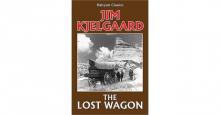 The Lost Wagon
The Lost Wagon The Spell of the White Sturgeon
The Spell of the White Sturgeon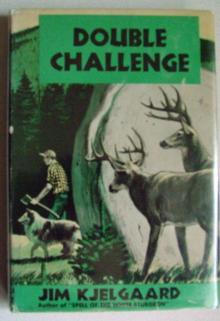 Double Challenge
Double Challenge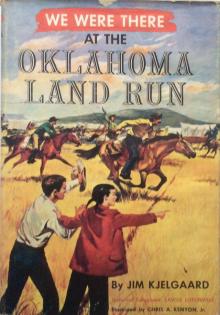 We Were There at the Oklahoma Land Run
We Were There at the Oklahoma Land Run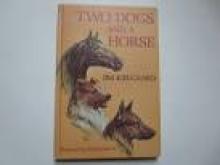 Two Dogs and a Horse
Two Dogs and a Horse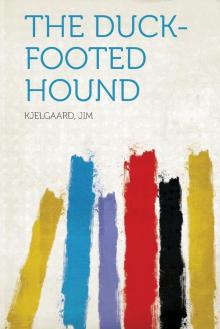 The Duck-footed Hound
The Duck-footed Hound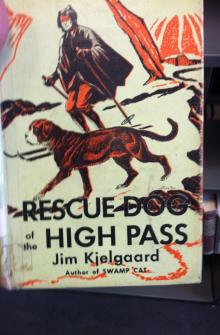 Rescue Dog of the High Pass
Rescue Dog of the High Pass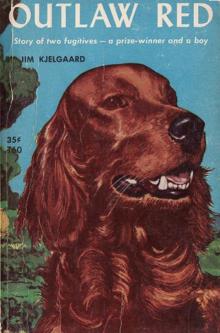 Outlaw Red
Outlaw Red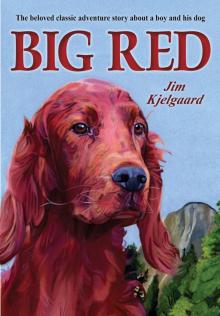 Big Red
Big Red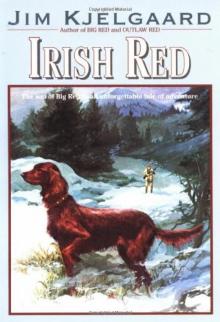 Irish Red
Irish Red